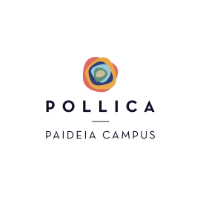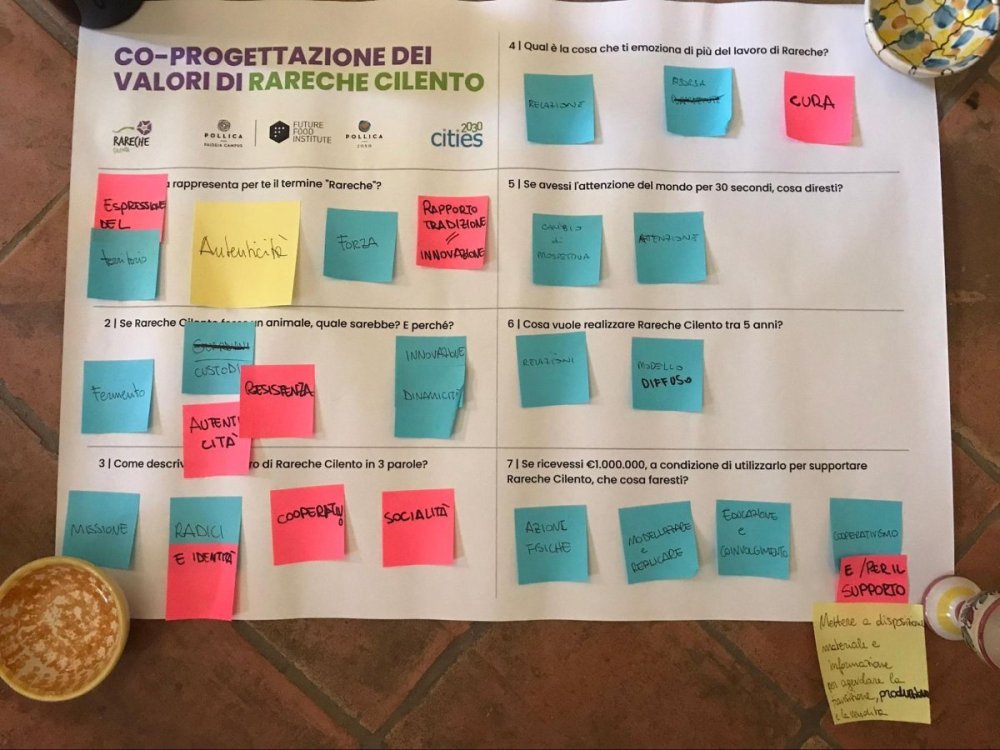Living: Workshops
Workshop 1 - Community hackathon
On March 26th and 27th, the Paideia Living Lab hosted a “Community Hackathon” to engage local citizens in challenge-based learning activities, using the systems thinking methodology.
Participants were asked to list the current problems they would see in their community, and then through mentoring and guidance they formed 4 teams and triend to hack the problems.
These are the projects that were ideated:
- The Park of the Treasure: Kids gathered up and designed activities to engage with foreing or tourist children, who spend their holidays in Pollica. The proposed activities include the organization of a communitarian Hide and Seek game, as well as a scavenger hunt to discover wild herbs and their culinarian use.
- Training and Innovation: The second group developed innovative ideas to connect local stakeholders and engage them in integrated and systemic training programs, such as food processing workshops, training programs to re-discover ancient traditions and upskilling programs for the hospitality sector.
- Community Oven: The third group designed a community wood-fired oven as gathering place and event-hosting place to regenerate the social fabric and promote intergenerational integration.
-
CilenToBe: The fourth group designed a hub dedicated to outdooring and outdoor sports, to discover the territory and promote sustainable leisure activities.
Workshop 2 - Local fishermen
On May 23rd 2022, on occasion of the European Agrifood Week, organized by Future Food Institute for the Representation Office of the European Commission in Italy, and more specifically, on occasion of the event “RegenerAction”, FFI held a workshop in Santa Maria di Castellabate (SA), involving
- Marco Rizzo, the Mayor of Santa Maria di Castellabate
- Stefano Pisani, the Mayor of Pollica
- Silvestro Greco, director of research at the Research Centre “Anton Dohrn”
- Cinzia Scaffidi, Journalist and Professor
- Giuseppe Palma, President of Assoittica, the largest association of private businesses in the fishing industry
- And the local community of fishermen.
The goal of the session was to collect problems in the 3 domains of interest (policies, research, business and fishing industry) and facilitate solution proposals.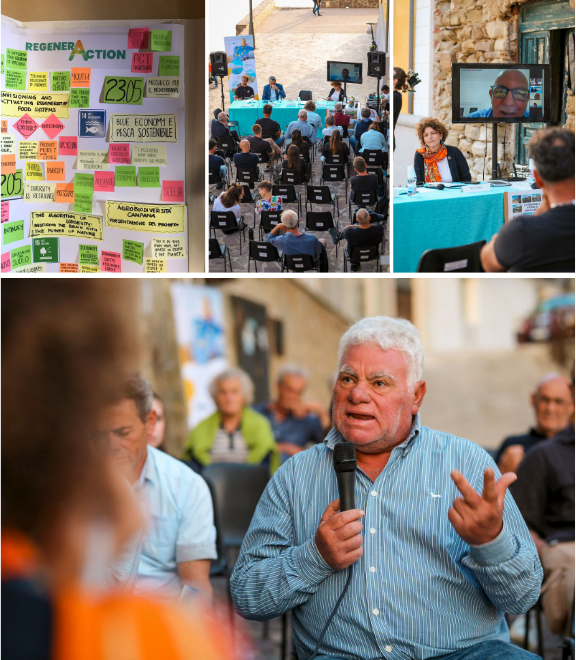
The session’s outputs were grouped as follows:
Values - the factors that drive small & coastal fishermen to continue fishing using traditional techniques
- Dignity and pride
- Tradition
- Environmental sustainability
- Tradition enlivenment and valorization
Problems - what is not working in the fishing industry
- Scientific community is not involved in the decision making
- There are many legislative paradoxes (policies are too far from the reality)
- If scientific data are not available, economists and decision makes draw data from the market - the time gap is too large and decisions don’t match with reality and true needs of fishermen
- Fish consumption has changed - now driven to narrower range and “commodified” fish species
- Climate change is changing the ecology of the sea
Needs - what are the real needs of fishermen
- Economic sustainability
- On-the-ground decision
Solutions - what can be done to improve livelihoods of fishermen, provide capillary data to research and nudge tailored policies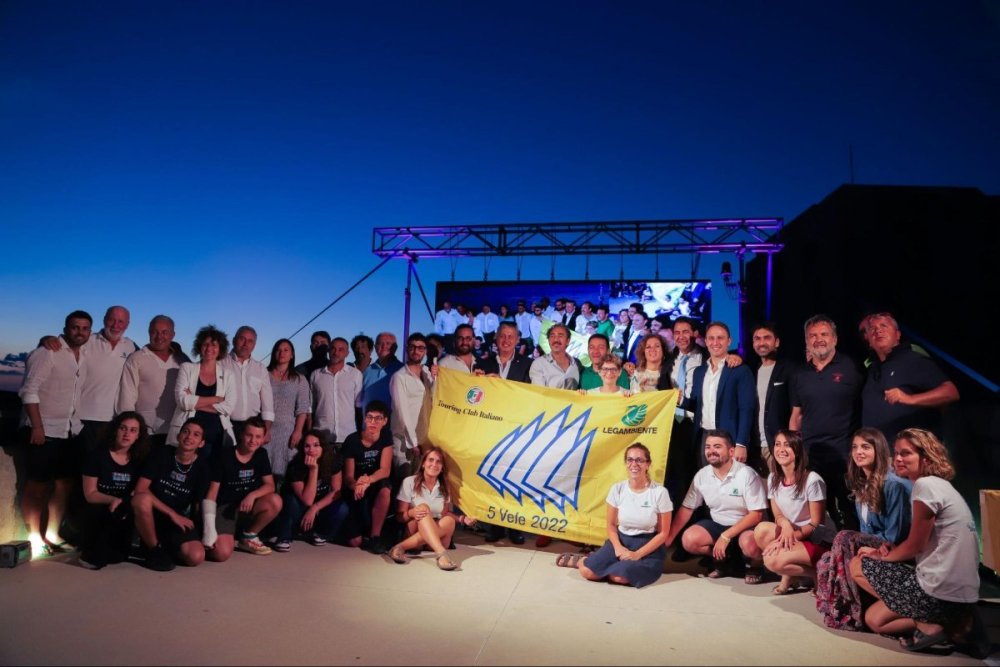
- Participatory research and citizen science
- Make research activity a tool to diversify income
- National or super-national policies
- Alliances
- Protect the sea to protect fishermen
- Make fishermen the true protagonists of Marine Protected Areas
- Establish an experimental cluster to allow these solutions to prosper
The outcome of the session, just 5 weeks after, was “Trame Mediterranee - Blue Edition”, an experimental programme held from 4th to 9th July 2022 involving 7 students of high schools and empowering them to be the watchmen of the sea and working with and interviewing fishermen in order to understand the deep complexity of their daily job.
After a week of interviews with fishermen and other stakeholders of the fishing sector, on 9th July 2022, was presented a manifesto for the establishment of the first Marine Experimental Area off the coast of Cilento. The Manifesto was signed by the Mayors of Cilento, the local groups of action (FLAG) Legambiente and FFI (link here), and set the basis for the creation of a working group to co-create the Marine Experimental Area.
Workshop 3 - Values co-creation with Rareche
June 24th, 2022, Vallo della Lucania
Need: Future Food Institute was asked by Rareche to moderate a session with them and other stakeholders of the regional food system, to create a shared and stable set of values for the future, in order to communicate them to the local community, the first target, in a more powerful way.
Objective of the session: moderate and co-create the shared set of values. In order to do so, a google form was created and sent to the stakeholders. The form contained the following questions:
-
What does the term “Rareche” mean to you?

- If Rareche Cilento were an animal, what would it be?
- How would you describe the work of Rareche Cilento in 3 words?
- What is the thing that moves you the most of the work of Rareche?
- If you had the world’s attention for 30 seconds, what would you say?
- What does Rareche Cilento realize in 5 years?
- If you received €1.000.000, on condition to use them to support Rareche Cilento, what would you do?
The answers were clustered and further discussed during the session, at which were present the following participants:
- 5 Farmers, representatives of the network of Rareche (Regenerative Farmers alliance and farmers’ market)
- Legambiente
- Slow Food Gelbison
- Parco Nazionale del Cilento
- Cilento Bio-District
- Living Museum of the Mediterranean Diet
- Future Food Institute
- Centro Studi Dieta Mediterranea
- Municipality of Vallo della Lucania
The values that came out reflected the need to communicate and sustain:
- Authenticity, identity and rootedness in the territory and its tradition and culture, while being at the same time innovative and at the forefront of the battle against the challenges of our food system
- The envisioning of a bright future, enlivening the roots of the past and bringing them to the future
- Care and custody of the natural, cultural, and social resources
- A strong cooperative spirit: resource, information and knowledge, goods and services
- The battle for resistance to the status quo, and advocacy for a change in perspective and in mindset, through action and education
- They will to create a small but powerful model, to be replicated and contextualized in order to have capillary and diffused impact
The result of this workshop will be further discussed with all the partners and will constitute the basis for a capillary and powerful communication and dissemination strategy.
Workshop 4 - Internal Systems Thinking Workshop (28th June)
Agenda
- Presentation to align on the models (20mins)
- Using the excel tool (60 mins)
- Wrap up (10 mins)
Moderators: Vyoma, Alessio
Expert guidance: Chhavi
Participants: Erika Solimeo, Virginia Cepollina, Camilla Carioli, Elisa Carioli
Tools used
- Co-creation workbook
- Presentation
Analysis of the workshop
-
Testing the Pollica regeneration model or the Food for earth model
- Measuring impact of the model would be good
- This could be way to show that our model works as a completely efficient model
-
Understanding and using the models
- Tough to understand the difference between the food security dimensions and the 4 pillars
- Nutrition safety is tough to understand
- Should we select the top dimension or all that matter?
- Tough to identify the codes and subdimensions
- The 4 pillars is the toughest model
- In the subdimensions it is not possible to touch more than 1. problems touch many subdimensions - not sure if the issue is related to the definition of the problem or the design of the sheet not allowing us more options
- We observed that the more umbrella broader problems fell under more pestle dimensions compared to detailed problems (not sure if this is an issue with problem definition)
-
Process of using the tool and the models
- It is a very slow process
- Initially it was tough - after the discussion it makes it easier -
- Easier to use compared to the start but the issues are still too broad
- We started using it better towards the end - But excel is maybe not the best tool - as the problems are very similar
- More visual cues would have been helpful - something like miro
-
Problem definition
- The problem is a bit too broad
- We need very specific problems
- Maybe develop a model to analyse the problems in a more granular way
- Some of these problems are interconnected - we could look at more specific problems inside the umbrella problem and connect them
- Problems - some are not issues - more details needed
- Guidelines of how to write the problems would be useful
- Statements were too broad
-
Coding of the tool
- We were trying to understand how they are prioritising the different models to get the final score
- Why is pestle not used to calculate the final score?
Reflections on the workshop
-
What went well?
- Most of the invitees showed up for the workshop
- Participation was decent
- Participants were confused at first but once we tried analysing a few problems, they got the hang of it.
- Towards the end most of the participants could comfortably discuss most models
-
What went bad?
- The ‘4 pillars of food security model’ was the toughest for the participants
- Some participants couldn’t understand how to contribute and did not speak
- Problem definition had several issues as most of the problems were too broad
- There were issues with the zoom room
-
What could be done differently?
- This could have been an in-person workshop to ensure active participation and to avoid logistical issues with the zoom room
- Problems can be well defined. Request for guidelines on how to write the problems needs to be checked from the makers of the tool
-
What was the feedback?
- Participants enquired for more details regarding the different models, the selection criteria, the coding of the tool and the coding of the final score
- Participants noted that there were too many models being used and all of them were tough to understand
- The ‘4 pillars of food security model’ was noted as the most confusing one
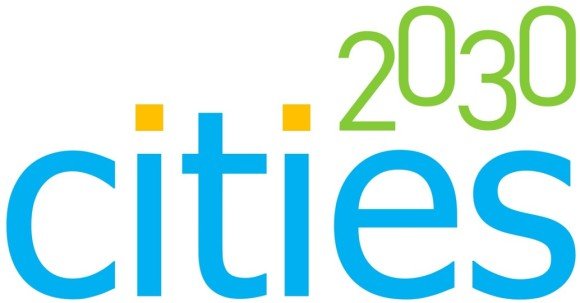
.jpeg.d6c78a680a91b987a93a6721d4557e0a.jpeg)
